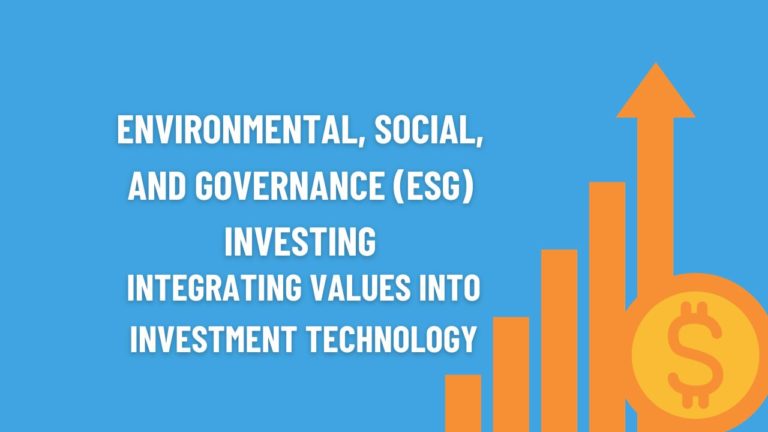The Rise of AI-Powered Investment Tools: Revolutionizing Portfolio Management.

Introduction:
The advent of Artificial Intelligence (AI) has brought about a paradigm shift in various industries, and the world of finance is no exception. One of the most significant impacts of AI can be witnessed in the realm of investment and portfolio management. AI-powered investment tools have emerged as game-changers, revolutionizing traditional methods and significantly altering the landscape of portfolio management.
Unveiling the Power of AI in Investment Tools:
AI has swiftly penetrated the investment sphere, offering a multitude of benefits that were previously unattainable through conventional means. These intelligent systems leverage machine learning algorithms, predictive analytics, and data processing capabilities to analyze vast amounts of financial data in real-time. They can identify patterns, trends, and anomalies far more efficiently than human capabilities, empowering investors with actionable insights for informed decision-making.
Enhanced Data Analysis and Decision-Making:
AI-driven investment tools excel in processing colossal volumes of financial data from diverse sources, such as market trends, company performance, economic indicators, and even sentiment analysis from social media. This ability enables investors to make more accurate predictions, assess risks, and seize opportunities that might otherwise go unnoticed. Through sophisticated algorithms, AI tools provide personalized recommendations tailored to an investor’s risk tolerance, financial goals, and preferences.
Risk Management and Mitigation:
The dynamic nature of financial markets often poses challenges in risk assessment and management. However, AI-powered tools offer a proactive approach to risk mitigation. By continuously monitoring market fluctuations and assessing historical data patterns, these systems can forecast potential risks and swiftly adapt investment strategies to minimize losses. Moreover, AI algorithms can detect anomalies or irregularities in trading patterns, alerting investors to potential fraud or market manipulation.
Algorithmic Trading and Automation:
One of the most prominent applications of AI in portfolio management is algorithmic trading. AI-powered algorithms execute trades based on predefined criteria, reacting swiftly to market changes and executing transactions at optimal times. This automation reduces human error, eliminates emotional biases, and capitalizes on fleeting market opportunities that might evade manual intervention. High-frequency trading, powered by AI, has become a cornerstone of modern financial markets due to its speed and precision.
Democratizing Investment Opportunities:
AI-powered tools have played a pivotal role in democratizing investment opportunities. They have made sophisticated investment strategies accessible to a broader spectrum of investors, including individual traders and small-scale investors. Robo-advisors, a prominent example of AI-driven tools, offer automated portfolio management and investment advice, enabling individuals with limited financial expertise to participate in the markets efficiently.
Challenges and Ethical Considerations:
Despite their transformative potential, AI-powered investment tools also face challenges and ethical considerations. Issues related to data privacy, algorithm bias, and overreliance on automated decision-making processes necessitate careful scrutiny and regulation. Ensuring transparency, fairness, and accountability in AI algorithms remains a pressing concern to prevent unintended consequences or discriminatory practices.
The Future of AI in Portfolio Management:
The evolution of AI in portfolio management is an ongoing journey marked by continuous innovation and refinement. Future advancements may include the integration of advanced AI models like deep learning for more complex analyses, enhanced natural language processing for sentiment analysis, and the incorporation of decentralized finance (DeFi) concepts for decentralized investment platforms.
7 AI Tools That WILL Make You RICH
Conclusion:
The rise of AI-powered investment tools signifies a transformative era in portfolio management. These tools have redefined how investors approach decision-making, risk management, and accessibility to financial markets. While presenting immense potential, the responsible development and ethical use of AI in finance are pivotal for ensuring its long-term sustainability and fostering trust among investors. As AI continues to evolve, its integration into portfolio management practices will undoubtedly shape the future of finance, fostering efficiency, accessibility, and informed decision-making for investors worldwide.
How To Start
In the ever-evolving landscape of finance, the advent of Artificial Intelligence (AI) has emerged as a catalyst for transformative change. Across various sectors, AI’s capabilities have reshaped conventional methods, and nowhere is this more evident than in the realm of investment and portfolio management. The integration of AI-powered tools has marked a paradigm shift, revolutionizing traditional approaches and ushering in a new era of unparalleled efficiency and precision in managing portfolios.
Picture this: an intricate web of algorithms processing vast amounts of financial data in real-time, uncovering patterns, discerning trends, and predicting market movements with a degree of accuracy that surpasses human capabilities. This is the power of AI-driven investment tools – a technological leap that is redefining how investors perceive, strategize, and execute their investment decisions.
The profound impact of AI in portfolio management can be traced through its multifaceted capabilities. These intelligent systems leverage cutting-edge machine learning algorithms and advanced data analytics to navigate the complexities of the financial markets. They meticulously analyze diverse data sets, ranging from market trends and economic indicators to company performance and even sentiment analysis extracted from social media platforms.
The primary advantage? The ability to distill this vast array of information into actionable insights that drive informed decision-making. Unlike traditional methods, AI-powered tools don’t just process data; they decipher intricate relationships between variables, predict potential market movements, and identify investment opportunities while mitigating risks.
At the core of this transformation lies the unparalleled data analysis capabilities of AI. Imagine sifting through terabytes of data, identifying correlations, and extracting valuable insights – a task that would overwhelm human capabilities but is seamlessly executed by AI algorithms. These tools provide investors with personalized recommendations, aligning investment strategies with individual risk tolerances, financial goals, and preferences.
Furthermore, AI-powered tools excel in risk management, a critical aspect of portfolio management often fraught with challenges. Through continuous monitoring of market fluctuations and historical data analysis, these systems anticipate and mitigate risks in real-time. They adapt investment strategies swiftly to minimize losses and can even detect anomalies in trading patterns, serving as a safeguard against potential fraud or market manipulation.
The automation prowess of AI is another cornerstone of its influence in portfolio management. Algorithmic trading, powered by AI, executes trades based on predefined criteria, capitalizing on market fluctuations and executing transactions at optimal times. This automation not only minimizes human error but also eliminates emotional biases, enabling investors to capitalize on fleeting market opportunities that might evade manual intervention.
The democratization of investment opportunities is yet another compelling aspect facilitated by AI-driven tools. These sophisticated systems have made complex investment strategies accessible to a broader spectrum of investors. Robo-advisors, a prominent example, offer automated portfolio management and investment advice, empowering individuals with limited financial expertise to participate more effectively in the markets.
However, amidst these remarkable advancements, challenges and ethical considerations loom on the horizon. Concerns related to data privacy, algorithmic biases, and the overreliance on automated decision-making processes necessitate careful scrutiny and regulation. Ensuring transparency, fairness, and accountability in AI algorithms remains a pressing concern to prevent unintended consequences or discriminatory practices.
The evolution of AI in portfolio management is an ongoing journey marked by continuous innovation and refinement. Future advancements may include integrating more advanced AI models such as deep learning for complex analyses, refining natural language processing for sentiment analysis, and exploring decentralized finance (DeFi) concepts for decentralized investment platforms.
In essence, the rise of AI-powered investment tools signifies a seismic shift in portfolio management. These tools have not just augmented capabilities but have fundamentally altered the way investors approach decision-making, risk assessment, and access to financial markets. As AI continues to evolve, its integration into portfolio management practices will undoubtedly shape the future of finance, fostering efficiency, accessibility, and informed decision-making for investors worldwide.





